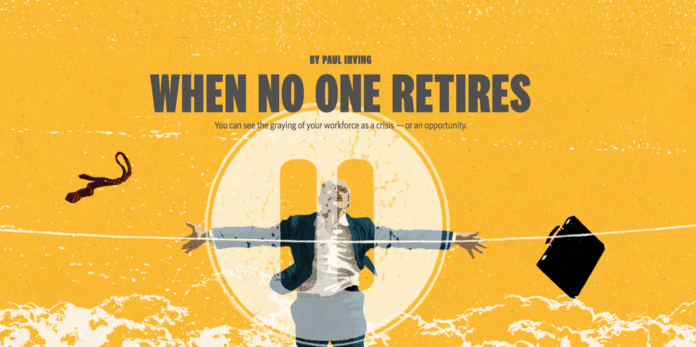By 2035, the number of Americans of retirement age will eclipse the number of people aged 18 and under for the first time in history.
Gerontologist Paul Irving writes about the implications of this demographic change in his article “When No One Retires“ in the Harvard Business Review. Irving is chairman of the Milken Institute Center for the Future of Aging, the chairman of the board of Encore.org, and a distinguished scholar in residence at the University of Southern California, Davis School of Gerontology.
Before our eyes, he writes, the world is undergoing a massive demographic transformation. In many countries the population is getting old. Very old. Globally, the number of people age 60 and over is projected to double to more than 2 billion by 2050, and those 60 and over will outnumber children under the age of five. In the United States, about 10,000 people turn 65 each day, and one in five Americans will be 65 or older by 2030.
“Companies need to embrace the aging of their working population by moving past ageist stereotypes and creating powerful, intergenerational teams,” Irving writes in the HBR article.
The reasons for this age shift are many — including medical advances that keep people healthier longer, falling fertility rates — but the net result is the same, concludes Irving: Populations around the world will look very different in the decades ahead.
Aging’s Impact on Economy and Society
Some in the public and private sector are already taking note — and sounding the alarm. In his first term as chairman of the US Federal Reserve, with the Great Recession looming, Ben Bernanke remarked, “In the coming decades, many forces will shape our economy and our society, but in all likelihood no single factor will have as pervasive an effect as the aging of our population.” Back in 2010, Standard & Poor’s predicted that the biggest influence on “the future of national economic health, public finances, and policymaking” will be “the irreversible rate at which the world’s population is aging.”
Irving’s HBR article pairs nicely with an article published this week in the Thorold News titled “The Case for Hiring a Boomer.”
“While some people are financially capable of retiring, not all are ready to retire,” says the article. “Many older people need to save longer for retirement so they don’t outlive their savings. Others just choose to work longer to continue to remain cognitively engaged and actively contributing to society.”
Misconceptions Abound
Unfortunately, misconceptions abound about us: we will get sick and leave, we are a drain on company benefits, we have difficulty adapting to change and lack technology capabilities, we won’t work as hard as younger people and “are just coasting toward retirement.”
Because of this, we experience the highest rate of unemployment in the general workforce, and for longer periods of time — double that of younger generations, cites the Thorold News article. Surveys consistently show people 50-plus believe they experience age discrimination in the job market. Some refer to this age group as “the new unemployable,” according to the article.
It is no secret that we offer considerable experience and skills, providing an opportunity for employers across all sectors, especially as the growth rate of the workforce slows or even shrinks in the future. And the companies lucky enough to hire us will reap the many benefits afforded to those who “strategically harness the power of generational diversity and build inclusive age-friendly, organizational cultures.”




Hello.
Good writing.
A couple of doubts.
Is it presumed there will be no World War III( In WWII, sixty million died) or another pandemic like now (with 1.3 million already gone) or cyclones, tsunamis etc as suggested by some doomsayers?
Regards
kpm1942@yahoo.com